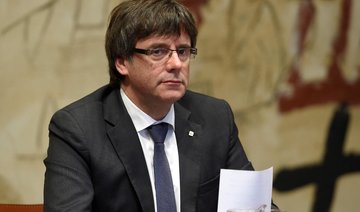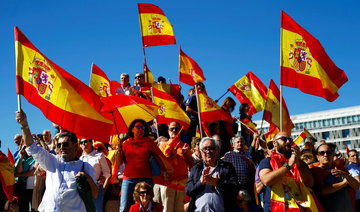BARCELONA: Hundreds of thousands of people took to the streets of Catalonia’s capital Barcelona on Sunday to express their opposition to declaring independence from Spain, showing how divided the region is on the issue.
A crowd estimated by local police to number 350,000 waved Spanish and Catalan flags and carried banners saying “Catalonia is Spain” and “Together we are stronger.” They poured into the city center after politicians on both sides hardened their positions in the country’s worst political crisis for decades.
Two more Catalonia-based companies set board meetings for Monday to decide whether to shift their head offices out of the region, adding to the intense pressure Catalan leader Carles Puigdemont is under to back away from declaring independence when he addresses the regional parliament on Tuesday.
Spanish Prime Minister Mariano Rajoy said on Saturday he would not rule out removing Catalonia’s government and calling a fresh local election if it claimed independence, as well as suspending the wealthy region’s existing autonomous status.
Catalonia, which has its own language and culture and is led by a pro-independence regional government, held a referendum on Oct. 1 over secession, in defiance of Spain’s constitutional court which had declared the vote illegal.
The Catalan authorities say the referendum showed voters overwhelmingly support independence.
More than 90 percent of those who voted backed secession, but opinion polls on the issue suggest the region is more closely divided. Turn-out for the referendum was 43 percent, with most residents who wish to remain in Spain staying home.
The anti-independence demonstration, which included Catalans and people from other parts of Spain, underlined how the dispute has riven the region itself. A month ago, a million people rallied in the city to support independence.
“We feel both Catalan and Spanish,” Araceli Ponze, 72, said during Sunday’s rally. “We are facing a tremendous unknown. We will see what happens this week but we have to speak out very loudly so they know what we want.”
Puigdemont will address the Catalan parliament at 6 p.m. (1600 GMT) on Tuesday on “the current political situation” amid speculation he could ask the assembly to declare independence.
Puigdemont said in an interview broadcast on Catalan television on Sunday that a law passed by the Catalan parliament preparing the way for the referendum called for a declaration of independence in the event of a “yes” vote.
“We will apply what the law says,” he said, according to a partial transcript released by TV3.
Puigdemont said he had not been in contact with the Madrid government for some time because Spain refused to discuss independence. “What is happening in Catalonia is real, whether they like it or not. Millions of people have voted, who want to decide. We have to talk about this,” he said.
Rajoy has said repeatedly he will not talk to the Catalan leaders unless they drop their plans to declare independence.
The Spanish government sent thousands of national police to the region to prevent the vote. About 900 people were injured when officers fired rubber bullets and charged crowds with truncheons in scenes that shocked Spain and the world, and dramatically escalated the dispute.
COMPANY MEETINGS
Losing Catalonia is almost unthinkable for the Spanish government. It would deprive Spain of about 16 percent of its people, a fifth of its economic output and more than a quarter of its exports. There is widespread opposition to a Catalan breakaway among people in the rest of the country.
The political stand-off has pushed banks and companies to move their headquarters outside Catalonia. The board of Catalonia-based infrastructure firm Abertis will meet on Monday to discuss moving its head office elsewhere in Spain, a source familiar with the matter said.
Real estate firm Inmobiliaria Colonial also called a board meeting for Monday to discuss moving its head office out of Catalonia, a source close to the firm said.
Companies that have already decided to move their head offices out of Catalonia include Spain’s third biggest lender, Caixabank, and the fifth-biggest, Sabadell.
The exodus adds to pressure on Catalan leaders by potentially undermining tax revenues paid by companies.
Concern is growing in EU capitals about the impact of the crisis on the Spanish economy, the fourth largest in the euro zone, and on possible spillovers to other economies.
Some European officials are also worried that any softening in Spain’s stance toward Catalan independence could fuel secessionist feelings among other groups in Europe such as Belgium’s Flemings and Italy’s Lombards.
Until the weekend, Rajoy has remained vague on whether he would take the unprecedented step of triggering Article 155 of the constitution, the so-called nuclear option which enables him to sack the regional government and call a local election.
However, asked if he was ready to do so, Rajoy told El Pais newspaper on Saturday: “I don’t rule out anything that is within the law ... Ideally, we shouldn’t have to take drastic solutions but for that not to happen there would have to be changes.”
Rajoy also said he planned to leave in Catalonia the 4,000 national police the government had shipped in for the referendum, until the crisis was over. He ruled out using mediators to resolve the crisis — something Puigdemont has said he is open to — and added the issue would not force a snap national election.
Sunday’s demonstration in Barcelona was organized by the anti-independence group Catalan Civil Society to mobilize what it believes is a “silent majority” that opposes independence.
“The people who have come to demonstrate don’t feel Catalan so much as Spanish,” said 40-year-old engineer Raul Briones, wearing a Spanish national soccer team shirt. “We like how things have been up until now and want to go on like this.”
The rally was addressed by Nobel prize-winning novelist Mario Vargas Llosa, who has dual Spanish and Peruvian nationality. He told reporters it showed many Catalans “don’t want the coup d’etat the Catalan government is fostering.”




























